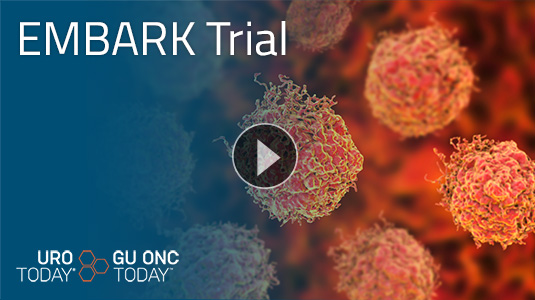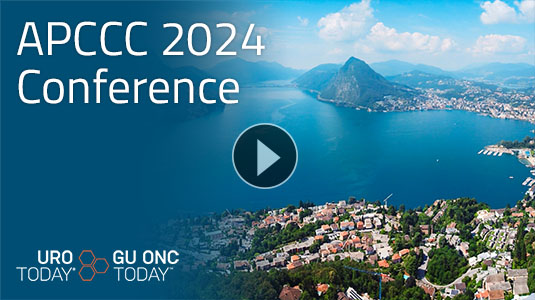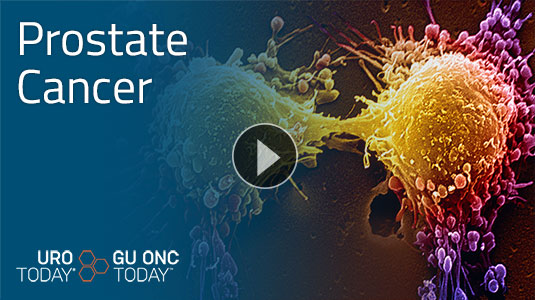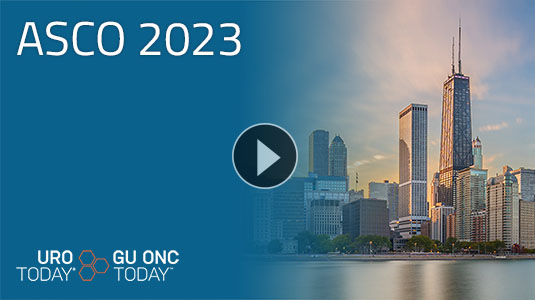ESMO 2024: Enzalutamide with or Without Leuprolide in Patients with High-Risk Biochemically Recurrent Prostate Cancer: EMBARK Post Hoc Analysis by Age
Presented by Neal D. Shore, MD, FACS
The 2024 ESMO annual meeting included a session on prostate cancer, featuring a presentation by Dr. Neal Shore discussing a post hoc analysis from EMBARK focusing on age.
Read More
ASCO 2024: EMBARK Post Hoc Analysis of Sexual Activity PROs in Patients Who Were Sexually Active or Interested in Sex at Baseline
Presented by Stephen J. Freedland, MD
The 2024 ASCO annual meeting featured a session on prostate cancer, and a presentation by Dr. Stephen Freedland discussing a post hoc analysis of EMBARK assessing sexual activity patient-reported outcomes in patients who were sexually active or interested in sex at baseline.
Read More
ASCO 2024: EMBARK Post Hoc Analysis of Impact of Treatment Suspension on HRQoL
Presented by Stephen J. Freedland, MD
The 2024 ASCO annual meeting featured a session on prostate cancer, and a presentation by Dr. Stephen Freedland discussing a post hoc analysis of EMBARK assessing the impact of treatment suspension on health-related quality of life.
Read More
AUA 2024: Prostate-Specific Antigen Dynamics from the Phase 3 EMBARK Trial: A Post Hoc Analysis
Presented by Stephen Freedland, MD
The 2024 American Urological Association (AUA) Annual Meeting held in San Antonio, TX between May 3
rd and 6
th, 2024 was host to an advanced prostate cancer podium session. Dr. Stephen Freedland presented the results of a post hoc analysis of EMBARK evaluating PSA dynamics.
Read More
APCCC 2024: Which Patients with High-Risk First BCR after Radical Prostatectomy Are Candidates for Systemic Therapy Alone Without Local Salvage Radiotherapy?
Presented by Bertrand Tombal, MD, PhD
The 2024 APCCC meeting featured a session on the treatment for biochemical recurrence/PSA persistence, and a presentation by Dr. Bertrand Tombal discussing patients with high-risk first biochemical recurrence after radical prostatectomy who are candidates for systemic therapy alone without local salvage radiotherapy.
Read More
ASCO GU 2024: EMBARK Post Hoc Analysis of Sexual Activity Patient-Reported Outcome Measures
Presented by Stephen Freedland, MD
(UroToday.com) The 2024 American Society of Clinical Oncology Genitourinary (ASCO GU) cancers symposium held in San Francisco, CA was host to a prostate cancer poster session. Dr. Stephen Freedland presented an EMBARK post hoc analysis of sexual activity-related patient reported outcome measures.
Read More
ASCO GU 2024: Enzalutamide Combination Treatment Suspension in Men with High-Risk Biochemically Recurrent Prostate Cancer: Outcomes from EMBARK
Presented by Stephen Freedland, MD
(UroToday.com) The 2024 American Society of Clinical Oncology Genitourinary (ASCO GU) cancers symposium held in San Francisco, CA between January 25
th and 27
th was host to a prostate cancer poster session. Dr. Stephen Freedland presented the results of an EMBARK post-hoc analysis evaluating enzalutamide combination treatment suspension in men with high-risk biochemically recurrent prostate cancer.
Read More
ESMO 2023: Invited Discussant: More Than Therapy Alone
Presented by Boris A. Hadaschik, MD
(UroToday.com) At the 2023 ESMO annual meeting, Dr. Boris Hadaschik presented on prostate cancer, discussing three abstracts from the EMBARK study by Dr. Stephen Freedland, the STAMPEDE trials by Dr. Charles Parker, and fracture-related hospitalizations by Dr. Craig Jones.
Read More
ESMO 2023: EMBARK: Health-Related Quality of Life in nmHSPC Patients with High-Risk BCR
Presented by Stephen J. Freedland, MD
(UroToday.com) The 2023 ESMO annual meeting included a session on prostate cancer, featuring a presentation by Dr. Stephen Freedland discussing health-related quality of life in nonmetastatic hormone-sensitive prostate cancer patients with high-risk biochemical recurrence from the EMBARK study. Enzalutamide + leuprolide acetate and enzalutamide alone delayed metastasis-free survival (MFS) vs placebo + leuprolide acetate in high-risk BCR nonmetastatic hormone-sensitive prostate cancer in the phase 3 EMBARK trial:
1 Read More
ESMO 2023: Treatment of High-Risk Biochemically Recurrent Prostate Cancer with Enzalutamide in Combination with Leuprolide Acetate: Secondary Endpoints from EMBARK
Presented by Stephen Freedland, MD
(UroToday.com) The 2023 European Society of Medical Oncology (ESMO) Annual Congress held in Madrid, Spain between October 20
th and 24
th, 2023 was host to a prostate cancer abstracts poster session. Dr. Stephen Freedland presented results of the secondary analysis of EMBARK, specifically those pertaining to enzalutamide in combination with leuprolide acetate for the treatment of prostate cancer patients with high-risk biochemical recurrence.
Read More
ESMO 2023: Enzalutamide Monotherapy for the Treatment of Prostate Cancer with High-Risk Biochemical Recurrence: EMBARK Secondary Endpoints
Presented by Ugo F. De Giorgi, MD, PhD
(UroToday.com) The 2023 European Society of Medical Oncology (ESMO) Annual Congress held in Madrid, Spain between October 20
th and 24
th, 2023 was host to a prostate cancer abstracts poster session. Dr. Ugo De Giorgi presented results of the secondary analysis of EMBARK, specifically those pertaining to enzalutamide monotherapy for the treatment of prostate cancer patients with high-risk biochemical recurrence.
Read More
ASTRO 2023: Duration and Combination of Systemic Therapies for Patients with Very High Risk, Node Positive, and Oligometastatic Prostate Cancer
Presented by Dr. Anne Rajkumar, MD
Dr. Rajkumar began by presenting a case of a 56-year-old male with Gleason score 4+5=9 disease, PSA 5.1 ng/ml, and with evidence of extraprostatic extension on imaging. His PSMA-PET was negative for regional and distant disease. He declined surgery in favor of radiation therapy. Given his NCCN high-risk classification, what are considerations for his hormone therapy?
Read More
ASCO 2023: PSMA PET Findings in an “EMBARK-like” Cohort of Patients with High-Risk Non-Metastatic Hormone-Sensitive Prostate Cancer: A Single Center Post-Hoc Retrospective Analysis
Presented by Wesley R. Armstrong
(UroToday.com) The 2023 ASCO annual meeting included a prostate cancer session featuring a presentation by Wesley Armstrong discussing PSMA PET findings in an “EMBARK-like” cohort of patients with high-risk non-metastatic hormone-sensitive prostate cancer. Non-metastatic hormone-sensitive prostate cancer is defined by rising PSA levels while naïve or responsive to ADT and without evidence of metastasis on conventional imaging.
Read More
AUA 2023: Phase 3 Randomized Study of Enzalutamide or Placebo Plus Leuprolide Acetate and Enzalutamide Monotherapy in High-Risk Biochemically Recurrent Prostate Cancer: EMBARK
Presented by Neal Shore, MD, FACS
(UroToday.com) Dr. Neal Shore continued the morning plenary session with an excellent presentation on the late breaking abstract regarding the EMBARK clinical trial for high risk biochemically recurrent prostate cancer. The trial started recruitment in January 2015 and accrued the final patients in August 2018.
Read More
AUA 2023: EMBARK: A Phase 3 Randomized Study of Enzalutamide or Placebo Plus Leuprolide Acetate and Enzalutamide Monotherapy in High-Risk Biochemically Recurrent Prostate Cancer
Presented by Neal Shore, MD, FACS
(UroToday.com) The 2023 American Urological Association (AUA) annual meeting held in Chicago, IL, was host to a plenary session with Dr. Neal Shore presenting the long-awaited results of EMBARK, a phase 3 randomized study of enzalutamide or placebo plus leuprolide acetate and enzalutamide monotherapy in high-risk biochemically recurrent prostate cancer.
Read More







